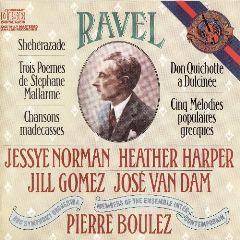Ravel – Sheherazade, Don Quichotte a Dulcinee, Chansons madеcasses etc. (1984)
Ravel – Sheherazade, Don Quichotte a Dulcinee, Chansons madеcasses etc. (1984)

Sheherazade I. Asie (9:27) II. La flûte enchantée (2:45) III. L'indifférent (3:30) Trois poemes de Stephane Mallarme I. Soupir (4:25) II. Placet futile (4:35) III. Surgi de la croupe et du bond (3:39) Chansons madеcasses I. Nahandove (6:01) II. Aoua! (3:45) III. Il est doux... (3:57) Don Quichotte a Dulcinee I. Chanson romanesque (2:26) II. Chanson epique (3:07) III. Chanson а boire (1:55) 5 Melodies Popular Grecques I. Chanson de la mariee (1:27) II. La-bas, vers l'eglise (1:21) III. Quel galant m'est comparable (0:50) IV. Chanson des cueilleuses des lentisques (2:38) V. Tout gai! (1:01) Jessye Norman, soprano Jose van Dam, Baritone Heather Harper, soprano Jill Gomez, soprano BBC Symphony Orchestra Ensemble Intercontemporain Pierre Boulez, conductor
This thoroughly recommendable issue is most welcome on CD, where its appreciable attributes can be even more clearly heard. Each singer has been carefully chosen for his or her task, and the contrast in timbres is, for the most part, illuminating. My single reservation concerns Heather Harper whom I now find a little cool for Sheherazade, in spite of the obvious distinction of her phrasing, but then this cycle isn't that well suited to Boulez's talents for stereoscopic precision and minute calculation. The other three singers have hardly been bettered as interpreters of their songs, and Boulez and his BBC and Parisian colleagues play throughout with delicacy combined with pinpoint accuracy. The recordings, made at different times in the 1970s and 1980s, are finely balanced. So I am as enthusiastic about the disc as I was back in 1984, if not more so. --- Gramophone [4/1987]
This is a very strong recording of Maurice Ravel's vocal music led by Pierre Boulez. I'm surprised it hasn't been reviewed yet. You will want to own this CD if you are a Ravel fan:
"Sheherazade" dates from 1903, early in Ravel's career, when he was just 28. It is a piece that has evoked a wide variety of interpretations, many of them brilliant. If you like this work, I urge you to hear the great, propulsive rendition by Janet Baker and Thomas Barbirolli (EMI) and the beautiful more measured approach by Regine Crespin and Ernest Ansermet (Decca) for two other approaches. As one would expect from his other performances, Boulez presents a precise, clear and technically note-perfect interpretation. The soloist, Heather Harper, is terrific. The result for me is powerful emotionally and tonally luscious and compares with the two 1960s interpretations I praise above. The disc is worth it just for "Sheherazade".
Also outstanding is the recording of the 1913 "Trois Poemes de Stephen Mallarme" with Jill Gomez as soloist. The Mallarme poems mark what I think is Ravel's deepest dive in musical avant-gardism and takes repeated listenings to understand. It is almost atonal and has sparse, precious textures. As good as Harper is technically in "Sheherazade," Jill Gomez is perhaps even better in this set of songs. She has a beautiful, rich voice and hits every one with confidence and clarity. (I like this interpretation a bit better than the very good performance by Dawn Upshaw in "The Girl with the Orange Lips.") The "Chansons madecasses" (1926 ) with Jessye Norman takes a mysterious, evocative approach to this modernist set of three songs tapping into Malagasy culture. The older Jan De Gaetani performance sets up the singer in front of the small chamber ensemble while Norman seems to be located inside of the instrumental grouping, making for a more ensemble-oriented approach. This is not my favorite Ravel piece but I actually prefer the Norman/Boulez interpretation - which is more somber and sultry -- to the fine De Gaetani version, so this is another plus for the disc.
Ravel experienced a tragic car accident in 1931, which cut short his career and eventually his life. His final completed work is the short "Don Quixote a Dulcinee", a Spanish-themed set of three songs finished post-accident in 1933. I very much enjoy this work and the famous Jose Van Dam is excellent, singing with precision and the right blend of tragicomedy. Van Dam is less successful in an arrangement of Greek Popular Songs, where he is uncharacteristically sometimes off pitch while at other times his voice is raw. --- jt52, amazon.com
download (mp3 @320 kbs):
uploaded yandex 4shared mediafire mega solidfiles zalivalka cloudmailru filecloudio oboom








